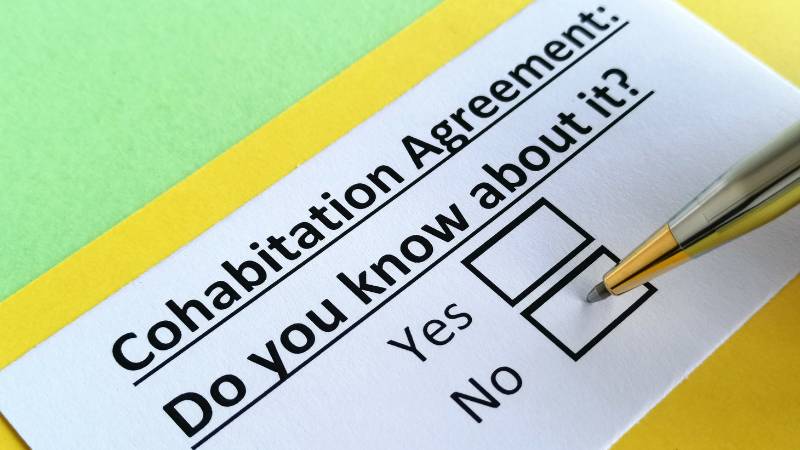Changes in society over the years have seen more couples in the UK choosing to marry later or not at all. Figures from the Office for National Statistics show that around 20% of families in the UK are now made up of cohabiting couples, a figure that is only likely to increase.
While cohabitation is on the rise, many people are unaware that cohabitees do not enjoy the same legal protections or financial benefits under UK law as those who are married or in a civil partnership. In this article we clarify the legal situation and look at some simple steps unmarried couples should take to make sure they, their families and their assets are protected, with a particular focus on Cohabitation Agreements, Wills and Declarations of Trust.
Are there any legal rights for unmarried couples living together?
Unlike in a divorce or civil partnership dissolution, there are no particular rules that automatically apply if you split up from someone you have been living with but are not married to.
Many people wrongly believe that the status of “common law” husband or wife will give them recognition in the same way as a spouse. They believe that living with someone for a certain period of time automatically entitles them to some financial support or to a share of the property if the relationship comes to an end. This is incorrect and the law treats cohabitees as unconnected strangers which can lead to financial and emotional hardship following a separation or the death of one partner.
There was an attempt to introduce a Cohabitation Rights Bill in parliament to give certain protections to cohabitees, but this stalled permanently in 2020. While there has long been recognition that the situation is unfair, there are unlikely to be changes in the law in the near future, so unmarried couples should take steps now to secure their own futures.
Three steps unmarried couples can take
Because unmarried couples don’t automatically get the same rights as married couples, they have to make a conscious decision to agree what their goals are and then put specific legal agreements in place to achieve those goals. This will involve discussion about money, assets and children and also considering the possibility of separation or death which many people will find difficult or awkward. It will also cost money to prepare the agreements, but we cannot stress enough the benefit of investing that time, effort and money to protect the future position for both partners.
There are three distinct steps to protecting your position while you are alive and after your death:
- Cohabitation Agreements to agree how you will split and manage your finances
- Declarations of Trust for any properties that you jointly own
- Wills to cover you and your dependents if one or both of you die
Step 1 – Cohabitation Agreements
A Cohabitation Agreement is a legal contract between you and your partner that deals with three principal areas:
- Who owns (and owes) what at the time of the agreement, and in what proportions
- What financial arrangements you have decided to make while you are living together
- How property, assets and income should be divided should you split up
It is a useful way to protect both you and your partner should the relationship come to an end. It can also help with dividing up bills and other outgoings while you live together.
You can have a Cohabitation Agreement drawn up at any time, whether you are about to start living together or if you have been doing so for many years.
Step 2 – Declarations of Trust
A Declaration of Trust is a deed which sets out terms relating to the ownership of a property between two parties. For example, if one partner has put a larger deposit into a property than the other, the Declaration of Trust can be drafted to ensure that amount is acknowledged as being theirs and they would be entitled to it, should the property be sold due to a break-up. This can be done in simple percentage terms, or it is possible to have more complicated arrangements taking account of growth in the value of the property over time and even how much each party contributes towards mortgages and upkeep.
Whilst a Declaration of Trust is recommended, it only covers the ownership of property and not other financial arrangements as a Cohabitation Agreement would, so we recommend having both.
Step 3 – Wills
Wills are particularly important for unmarried couples as without them a surviving partner has no automatic right to the estate of their deceased partner. This can and does cause hardship when the deceased partner was the main breadwinner or owned the lion’s share of the assets in the relationship. While it is possible to make a claim on an estate where there is no Will, it is a much longer, more complicated and expensive process than simply writing Wills while both parties are still alive.
In the simplest case, “mirror” Wills allow each partner to leave everything to the other. In more complex cases, Wills can additionally:
- provide support for children from current and previous relationships
- decide exactly who gets what in the way of money and assets
- provide for charitable legacies
- create trusts
- divide up business assets
- make sure the estate is tax efficient so it doesn’t pay more inheritance tax than it needs to
How can Backhouse Solicitors help you?
Whether you need a Cohabitation Agreement, a Declaration of Trust or a Will, the expert team at Backhouse Solicitors are here to help you. For information or advice, or to book a free 30-minute consultation with one of our experts to discuss your circumstances, contact our friendly team today.
Tel: 01245 893400
Email: info@backhouse-solicitors.co.uk
Visit: 17 Duke Street, Chelmsford, CM1 1JU
Or send us a message through the Contact Us page on this website.






